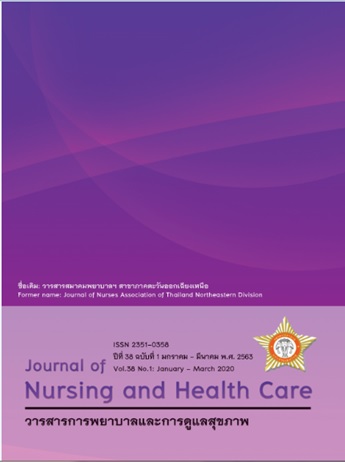Factors Influencing Quality of Life in End-stage Renal Disease Patients Receiving Continuous Ambulatory Peritoneal Dialysis, Nongkhai hospital
คำสำคัญ:
คุณภาพชีวิต, โรคไตวายเรื้อรังระยะสุดท้าย, การล้างไตทางช่องท้องอย่างต่อเนื่องบทคัดย่อ
Current, continuous ambulatory peritoneal dialysis is a method of renal replacement therapy that has a large number of patients. Because it is the first choice in the treatment of chronic kidney disease of the National Health Security Office.
This research aims to study factors influencing quality of Life in end-stage renal disease patients receiving
continuous ambulatory peritoneal dialysis in Nongkhai hospital. Predictive factors consist of age, occupation, self-management behavior and social support. The participants are end-stage renal disease patients receiving continuous ambulatory peritoneal dialysis at the Hemodialysis unit, Nongkhai hospital total 82 case. The instruments used for collecting data include 1) Personal data record form 2) Self-management behavior measurement 3) Social support questionnaire and 4) Kidney Disease Quality of Life Short Form (KDQOL-SFTM) Analyze data using descriptive statistics, Pearson correlation statistics and multiple regression analysis.
Most of the participants had an average age of 58.40 years, married status of 60.98 percent, not 52.44 percent of the occupation. An average family income of 7,802.40 baht per month and the comorbidities were diabetes mellitus with hypertension. The average duration of treatment with peritoneal dialysis is 3.07 years, The participants used the health insurance patent at the most 96.34%. The results showed that age, self-management behavior and social support able to predict the quality of life of end-stage renal disease patients who received continuous ambulatory peritoneal dialysis treatment at 63.72 percent with statistical significance. Self-management behavior with the power to predict the quality of life most, followed by social support and age, while occupational factors cannot predict the quality of life, probably because most patients do not have a career.
Therefore, the multidisciplinary team should organize activities to promote patient self-management behaviors by focusing on the context of the community. Together with the creation of family and network cooperation in continuous care at home helps prevent complications encourage patients to have a good quality of life.



